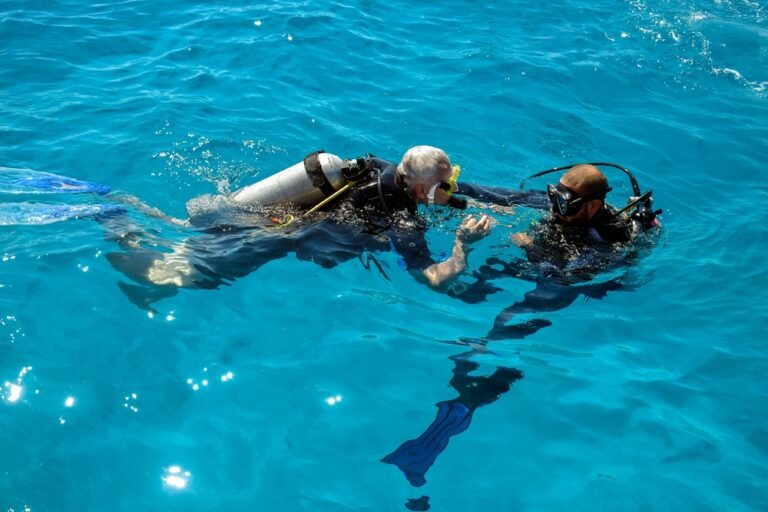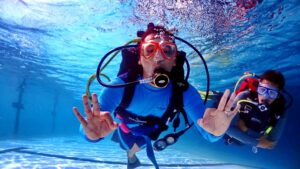Try Dive vs Discover Scuba Diving

“Try Dive” and “Discover Scuba Diving” (DSD) are terms often used by scuba diving organizations to describe introductory diving experiences designed for individuals who have little to no prior scuba diving experience. While these terms might be used interchangeably, the specific programs may vary slightly depending on the diving agency.
Whether it’s called a Try Dive or a Discover Scuba Diving experience, both provide a valuable opportunity for individuals to dip their toes into the underwater world and determine if they want to pursue further scuba training. If someone enjoys the experience, they can often use the introductory session as a steppingstone toward becoming a certified scuba diver.
What you can typically expect during your first dive
- Introduction and Paperwork: You’ll likely begin by completing some paperwork, including a medical questionnaire to ensure that you are in good health for scuba diving. If you have any pre-existing medical conditions, it’s essential to inform the instructor.
- Orientation and Briefing: Your scuba instructor will provide an orientation and briefing, explaining the basic principles of scuba diving, the equipment you’ll be using, and essential safety guidelines.
- Gear Fitting: You’ll be fitted with scuba diving equipment, including a wetsuit or drysuit, mask, fins, regulator, buoyancy control device (BCD), and a tank. The instructor will ensure that the equipment fits comfortably and is properly adjusted.
- Confined Water Session: The instructor will take you to a confined water area, often a swimming pool, where you can stand and get acclimated to breathing through a scuba regulator. This session allows you to practice basic scuba skills, such as clearing your mask, equalizing pressure, and using the buoyancy control device.
- Underwater Experience: Once you are comfortable with the equipment and basic skills, you’ll gradually descend into deeper water. The instructor will guide you through the experience, ensuring you feel at ease and assisting as needed.
- Exploration and Enjoyment: During your underwater adventure, you’ll have the opportunity to explore the underwater environment, observe marine life, and experience the unique sensation of weightlessness.
- Debriefing: After the dive, there will be a debriefing session where you can discuss your experience, ask questions, and receive feedback from the instructor.
It’s important to note that a Try Dive or Discover Scuba Dive is not a scuba certification course; it’s a one-time experience to introduce you to the basics of scuba diving. If you find the experience enjoyable and wish to pursue scuba diving further, you may consider enrolling in a full scuba certification course.
If you decide to pursue scuba diving certification, you will typically need to enroll in a full certification course. This course will cover essential theory, skill development, and open water dives. The training agency will issue a certification upon successful completion.
How long is a Try Dive or Discover Scuba Dive
The duration of your first scuba dive can vary depending on several factors, including the type of dive, the dive site, the conditions, and the specific program or course you are participating in.
Typically, the underwater portion of a Try Dive or Discover Scuba Diving (DSD) experience lasts around 20 to 30 minutes. This introductory dive is designed to give you a taste of scuba diving without overwhelming you. The goal is to provide a comfortable and enjoyable experience in a controlled environment. In comparison, fun dives for a certified diver typically last between 30 minutes to an hour, but this can depend on factors such as the dive site, the depth, and your air consumption.
How Deep Is a Try Dive or Discover Scuba Dive
The initial confined water session for a Try Dive or Discover Scuba Diving (DSD) experience often takes place in shallow water, such as a swimming pool or calm, shallow confined water area. Depths can range from a few feet to around 10 feet (1 to 3 meters). This ensures that participants feel comfortable and can easily stand up if needed.

Remember that scuba diving certification is an important step in becoming a safe and responsible diver. It ensures that you have the necessary knowledge and skills to enjoy diving while minimizing risks. If you’re interested in becoming a certified scuba diver, discuss your goals with the dive center or training agency, and they can guide you through the appropriate steps to achieve certification.
